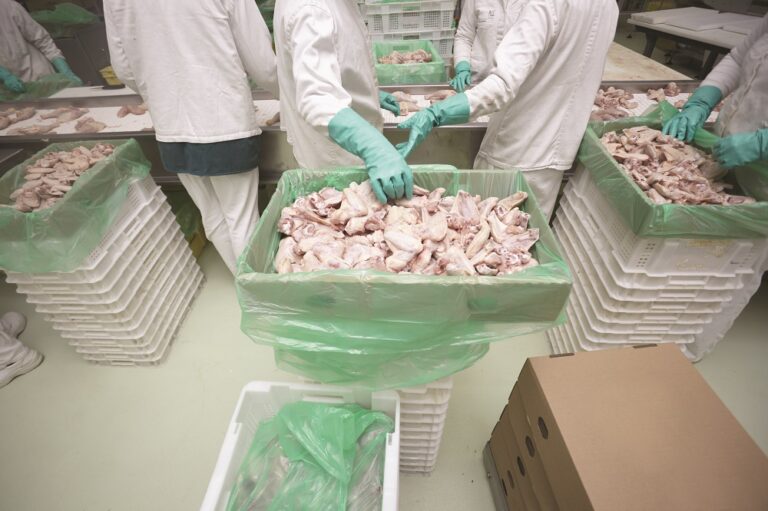An independent review of labour shortages in the food chain has called on Government to expand the migrant worker skilled worker route, a move the industry hopes will make it easier to recruit butchers from abroad.
The review, led by businessman John Shropshire, has also recommended that the Government and industry develop a strategy to enhance the sector’s image and highlight the opportunities available across the food sector.
Labour shortages have hampered the poultry supply chain for a number of years and the report highlights the shortage of poultry catchers and workers to clean poultry sheds.
The report, commissioned by then Defra Secretary George Eustice in August 2022 as a recommendation of the Government’s Food Strategy and published on June 30, links the labour challenges within the food chain to broader macroeconomic changes, including record-low UK unemployment and Brexit.
“This shortage of labour is not only due to competition from other sectors but also because of the impact of the UK leaving the EU, which has reduced the number of available EU workers,” it said.
In 2016, 20% of agriculture’s permanent workforce were EU nationals, and 95% of seasonal workers were from Bulgaria and Romania, while 40% of the food manufacturing workforce were EU nationals in 2014. There has been a steady decline in EU workers since 2016, although the report stresses that shortages are an issue in other EU countries, too.
“The reliance on migrant labour and uncertainty around immigration policy has created significant challenges for the industry,” the report said.
It said the evidence gathered also showed that the labour challenges also include ‘negative perceptions of the sector, unappealing working conditions such as physical demands, unusual working hours, undesirable environments, and repetitive tasks’.
It made 10 recommendations to industry and Government, including:
Implementing a comprehensive strategy to enhance sector attractiveness and promote opportunities in the food supply chain, led by the Food and Drink Sector Council, with a communication campaign aimed at demonstrating the sector is vital to the economy and national food security.
Replacing the Seasonal Worker visa scheme pilot by the end of 2023 with a scheme that ensures the industry has enough workers to maintain domestic food production levels.
The government should expand the eligibility criteria for the Skilled Worker visa route to include roles currently considered lower-skilled. The review supports industry and Defra submissions to the Migration Advisory Committee (MAC) under the Shortage Occupation List review, which include adding butchers to the list.
Businesses should provide clear training and career development plans for their UK-domiciled staff on the understanding it is an investment, not a cost.
The Government should completely overhaul the Apprenticeship Levy to provide a highly skilled workforce, including making it more flexible.
There must be collaboration to ensure a better understanding of the skills required by the food supply chain to allow a clear and purposeful strategy to be developed between government, education providers and industry.
Further and higher education funding bodies should review food supply chain-related subjects to ensure
courses are well-resourced and that recurrent and capital funding, is enhanced and protected in the long term.
Defra, in partnership with the Office for National Statistics and the Department for Education’s Unit for Future Skills, must set out a workforce data strategy aimed at improving the available data on labour and skills supply into the food supply chain to help businesses with workforce planning.
The government must improve access to funding that incentivises the uptake of automation among businesses in the food supply chain who reported struggling with the costs involved.
Farming Minister Mark Spencer welcomed the report. He said the Government had announced that more seasonal visas would be available next year.
“We also need to develop more attractive opportunities for UK domestic workers and make greater use of apprenticeships, and we continue to work with industry and across government on these areas,” he said. “We will look closely at the findings of the review and will set out our response in Autumn, as the Prime Minister confirmed at the recent Farm to Fork Summit.
NFU Deputy President Tom Bradshaw said: “We are pleased to see the independent panel recognises that action is needed to improve British farmers’ access to a skilled and motivated workforce.”
“Ensuring we have enough workers, both permanent and seasonal, is essential to maintaining domestic food security and providing British consumers with high quality, nutritious, climate-friendly food. Our own recent survey looking at worker shortages across the agriculture industry shows that 41%1 of respondents reduced the amount of food they produced due to being unable to recruit the essential workforce needed.
“We must now work together to solve the labour challenges impacting the industry, which is a brilliant one to work in and has many opportunities across all levels.”


